Thinking of the short-lived dream of "sending and shooting models", Yang Wen only felt that he was "stunned and turned the money around like being controlled". "Sending and photographing models" is an e-commerce "grey product" appearing on the Internet in recent years. Merchants mail clothes, daily necessities and other goods. Models play buyers and shoot a group of buyer shows. If they submit them to the designated e-commerce platform, they can get commissions ranging from 40 yuan to 200 yuan and get goods free of charge.
Search "send photos" on major social platforms and you will find a message "do you accept send photos" under a large number of posts. "Just take photos, you can wear good-looking clothes for free, get products for free, and make money. You can work two days a week and earn about 4000 yuan a month." Such a part-time job makes many people excited.
Most young people who want to do "sending photos" like taking photos and are keen to share photos on social platforms. They all hope to make some money by doing "sending photos".
Like Yang Wen, Li Jing and Niu Niu are attracted by "sending models". But they didn't expect that what they met was actually criminals who were prepared to empty their wallets in different "routines" in the name of "sending photos".
The Beijing News reporter found that in the industrial chain of "sending and shooting models", some criminals use this to guide netizens to pay dues, develop offline, recharge and swipe bills to defraud money.
Since this year, the police in Jiangsu and other places have issued warnings to prevent alternative part-time fraud in the name of "sending and shooting models", and pointed out that it is necessary to recognize that the essence of this "sending and shooting part-time" is the same as that of "brushing part-time".
According to the data recently released by the Criminal Investigation Bureau of the Ministry of public security, the crime of telecom network fraud has become the crime type with the largest number of cases, the fastest rise, the widest coverage and the strongest response from the people. Among them, the incidence rate of swiping and rebate fraud is the highest, accounting for about one third of the total number of cases.
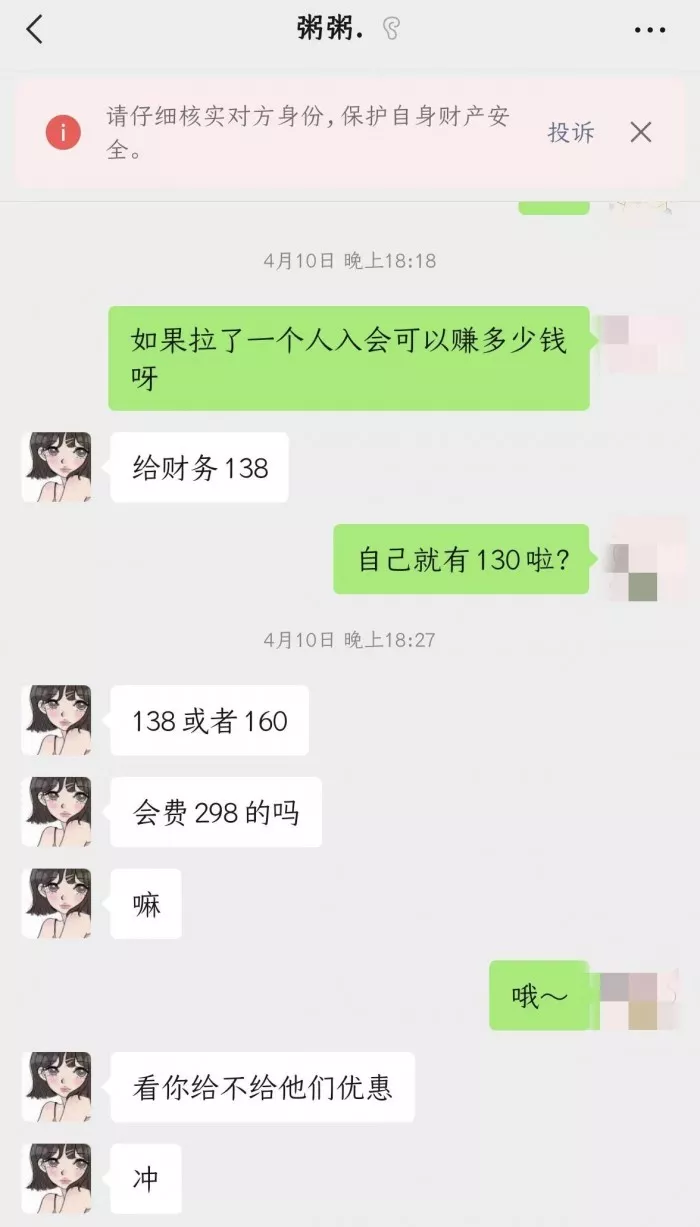
Li Jing communicated with the "introducer" to "pull the head" dues. Picture provided by the interviewee
"If you want to be a model, you have to pay 268 yuan"
On April 22, Li Jing reported four accounts claiming to "recruit and shoot models" on a social platform on the grounds of "publishing fraud information", and soon received a reply from the platform that "the report was successfully handled". She hopes that after these accounts are sealed, some people can avoid being cheated like herself.
At the beginning of this year, Li Jing, who is still a sophomore, saw a post calling herself "online auction agent" on the Internet, claiming to recruit posting models for a platform and brush comments for businesses. Each set of clothes needs to take 3 to 6 photos, and you can get a reward ranging from 40 yuan to 200 yuan.
Li Jing said that after contacting the "online auction broker", the other party told her that she needed to pay 268 yuan to enter the platform and obtain the qualification to receive orders on the platform. "It's a big platform and guaranteed." Agent introduction.
With the desire to earn pocket money, Li Jing sent several self photos and full body photos, and successfully passed the preliminary examination. Subsequently, she transferred 268 yuan of "membership fee" to the broker through wechat and was pulled into a single QQ group.
In the process of communication, the agent repeatedly stressed with Li Jing that "the membership fee will not be refunded in any form". If it is acceptable, she needs to reply "I accept". Later, Li Jing learned that the agent was the "publicity" of the platform, which was specially responsible for recruiting members.
The broker told Li Jing that there are three kinds of orders that can be received on the platform: sending auction orders, commission orders and sending auction orders.
The delivery order refers to that the part-time model places an order on the designated e-commerce platform first, takes photos to praise after receiving the goods, the platform and the merchant return the shopping expenses, and the part-time model can leave the goods.
The Commission for both Commission sheet and auction sheet is about 40-200 yuan. After receiving high praise, you need to send the goods back to the merchant.
The agent showed Li Jing a large number of screenshots of orders and told her that there was no upper limit on the number of orders made every day. Such an introduction made Li Jing feel that she vaguely saw the dawn of "economic independence".
But when she actually started receiving orders, she found that many "publicity" didn't tell her "hidden rules".
For example, the order placing link needs to "shop around". Li Jing needs to manually enter commodity keywords on the e-commerce platform, then browse three stores for one minute, and click the details, evaluation and other pages in turn. Then find the actual store to buy, add the goods to the shopping cart and complete the order. The whole process needs to record the screen on the mobile phone and send it to the person in charge for review.
Before placing an order, some merchants even need Li Jing to place an order in other stores, then cancel the order without payment, and then return to the target store to place an order.
Every step should follow the arrangement of the agent. The lack of one step may become the reason for "task failure". Li Jing needs to stare at her mobile phone all the time every day and check the platform information from time to time in class. Even if any step goes wrong, "it's a waste of time".
But after a week of operation, Li Jing didn't get any cash income. She only received three auction orders - two mobile phone cases and a bottle of nail polish, all of which were worth less than 30 yuan.
Li Jing found that almost all of the orders in the group were for sending photos, such as nail polish, ice sleeves, mobile phone cases and other cheap goods. She suspected that there was no so-called Commission bill at all.
At this time, the agent hinted that she "makes the most money by making publicity". For example, the membership fee for one person is 298 yuan. If you give it to the finance department for 138 yuan, you can get a commission of 160 yuan. If you get 10 people, you can not only get a commission, but also a bonus of hundreds of yuan.
Li Jing was a little excited, but she immediately realized that if there was no substantive operation, she just pulled people into the water, which was similar to MLM, "I don't think I have a conscience."
The reporter of Beijing News contacted a "publicity" on the grounds of wanting to join the association. A performance sheet displayed by the other party showed that the "publicity" with the highest performance attracted 26 newcomers in April alone. The "publicity" said that he had "worked for a small half a year and made more than 10000 yuan".
According to the reporter's investigation, in addition to the sending and shooting model platform joined by Li Jing, there are many similar part-time bill brushing platforms on the Internet. Because the amount involved is not large, many people will not choose to call the police after being cheated.
Kexin, who was also cheated, called the police. Just in her freshman year, like Li Jing, she also spent 286 yuan to join a part-time platform. She has not received any income and the membership fee is not refunded. After calling the police, she learned that this so-called "part-time" mode actually belongs to telecommunications fraud, but it is difficult to file a case due to the small amount involved.
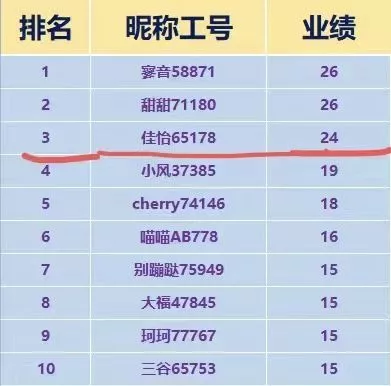
April performance list displayed by "foreign publicity". Picture provided by the interviewee
Triple order trap behind sending photos
If Li Jing and Kexin join the platform and can at least see the actual goods, what Niuniu and Zhang Qian encounter is a scam wrapped in the coat of "sending and shooting models".
Niuniu is a video blogger doing tourism content. In March this year, she received a private letter on a social platform asking her if she would like to "send photos". Thinking that she really needed beautiful clothes, she agreed to the job on April 8.
On the grounds of "successful cooperation plus wechat", the other party asked her to download an app called "Networking" and communicate and place orders on it.
"Networking" is like a "simple wechat" in Niuniu's eyes. The introducer guided her to add friends and asked her to add the merchant "landlady".
The "landlady" was very enthusiastic. She sent Niuniu a lot of photos of different styles, including clothes, leather bags, accessories and shoes. She also told her that she could choose whatever she liked from these clothes, and then send it to her by express. After taking the photos, send the clothes back.
As long as 6-9 photos per group are provided, each set can earn a commission of 180-300 yuan. "Landlady" also told her that small accessories are gifts and don't need to be sent back at that time.
Niuniu quickly picked out 10 clothes and told the "landlady" the address. Before waiting for the express order number, the other party pulled her into a group of "people". People in the group continue to send screenshots of completing the tasks of "verification" and "order grabbing" to show their income. She was confused and didn't understand what this had to do with "sending photos".
The "landlady" told Niuniu that the screenshots in the group came from a third-party payment platform, and orders and shipments were traded through the platform app. Then, the "landlady" sent her the download link of the payment platform and asked her to register.
Niuniu was worried about the clothes she had selected and asked when they would be delivered. The "landlady" said that there were too many people receiving orders, coaxed her to register first and explained that the express delivery should be packaged and delivered tomorrow.
Niu Niu recalled that when downloading the payment app, the mobile phone system intercepted and prompted her three times, and even asked her to enter the initial password of the mobile phone before allowing the installation, but she still downloaded the software.
After registration, she was surprised to find that her account was "negative equity". At this time, the "landlady" explained that because the model does not need to pay a deposit for sending goods, the first order needs to deposit 500 yuan in her own account.
In addition, the "landlady" also told Niuniu that in order to further build trust, models also need to rush to buy some virtual goods in the group. The more they rush, the express delivery order will be advanced. In addition, snapping up virtual goods is also a step to verify integrity and earn commissions at the same time. Recharge the principal of 500 yuan can be snapped up three or four times, and the principal of 500 yuan and the profit of about 15 yuan will be returned.
"I was also very strange at that time. There was no internal connection between grabbing orders and sending photos." But Niuniu was full of beautiful clothes, so he had to speed up the action of grabbing orders on the platform.
In Niuniu's group of 86 people, people send screenshots of successful order grabbing every day to show their income. Niuniu paid 500 yuan several times according to the guidelines, and they all returned to their bank accounts steadily, and they did make some more profits. These "smoke bombs" let Niuniu relax their vigilance.
The next day, the platform asked her to upgrade the order grabbing quota and invest 1100 yuan at a time. After the order grabbing is successful, the 1100 yuan can also be returned to her hand and the profit will increase. In a few days, the platform asked her to transfer the principal of 6000 yuan at one time.
After transferring 6000 yuan, Niuniu began to be nervous. At this time, she was told that the order grabbing rule had changed to "triple order", that is, all the principal and profits would be returned to her after three orders grabbing. The first order is only 60000 yuan, and the second order is only 60000 yuan.
Niuniu hesitated. She asked the "landlady", and the answer given by the other party was that if there was not enough money, she could go to the group for help. Someone in the group "generously" promised to lend her 5000 yuan, but she had to fill the rest by herself.
The 6000 yuan already given was like a hot potato, which put Niuniu in a dilemma. Niuniu gritted his teeth and clicked the transfer key of 26000 yuan.
But just when the 26000 yuan was about to be transferred, Niuniu received a customer service call from the bank and asked her whether she was brushing the bill in a strange software or whether she wanted to grab the "triple bill".
The bank staff made the means of the platform very clear and told her that the bank had temporarily frozen the money. In that phone call, Niuniu suddenly woke up and confirmed that he had "been recruited".
She went to question the "landlady", and the other party threatened her in her voice, "even if you want to go through legal procedures, you should complete this order."
Subsequently, Niuniu went to the police station to report the case. The police told her that although the number of "sending and shooting" scams was not large, the "triple order" was not a new method. It had existed for 3-5 years. "In fact, it was a case of sending and shooting on the brush sheet."
When talking to the police about group chat, she was told that the group of 86 people is likely to be operated by the same criminal, and the message may be sent by robots.
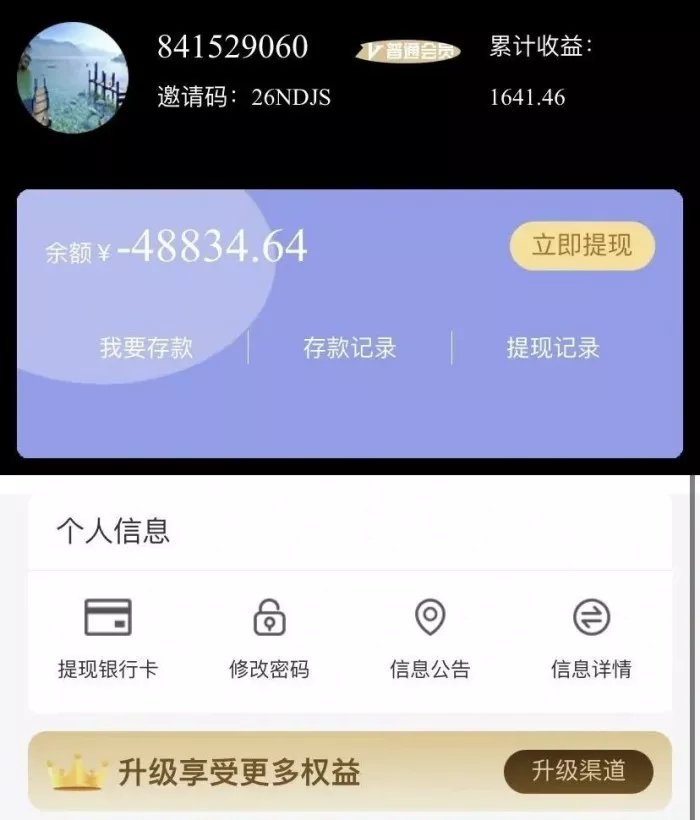
Zhang Qian's account balance in the "friends information" app. Picture provided by the interviewee
Similar to Niu Niu's experience, Zhang Qian, who claims to be familiar with e-commerce bill brushing, is also "planted" in this scam.
Zhang Qian, 25, has been doing business with her family in Beijing dahongmen clothing wholesale market since childhood. Now she operates a clothing store and an e-commerce store in Cangzhou.
In February this year, Zhang Qian wanted to "find a better order brushing intermediary" for her shop, so she found a person who claimed to be able to engage in this business through the social platform. She wanted to try it first. Then the other party sent a link and asked Zhang Qian to download an app called "friend information" in the mobile browser.
After downloading the app, the recommender told her that since the merchant delivers goods without fee and deposit, the participants need to reach a certain credit score before they can deliver goods. The way to obtain credit score is to do three-day overseas shopping on the platform they provide, 8-10 orders per day, and each order will have a certain commission.
At first, Zhang Qian felt quite normal, because "it is impossible to trust a person unconditionally".
In the first two days, Zhang Qian matched the list of less than 1000 yuan and could return it in less than half an hour. Early in the morning of the third day, the first order she matched was 300 yuan, and the next order was 7000 yuan. Because the withdrawal was very smooth before, she made up the money with confidence.
The recommender "excitedly" told her that this was the first order of the "welfare triplet". The second order matched a list of more than 20000 yuan. The order showed that she could get a commission of nearly 500 yuan. Zhang Qianxin made up for it.
At this time, the principal and commission did not return to her account as expected. The recommender "congratulated her" again, saying that she was lucky and had a third order. This order shows Dior's Embroidered Handbag in spring and summer of 2021, with an amount of 49900 yuan and a commission of 898 yuan.
At this time, Zhang Qian hesitated. She had charged nearly 50000 yuan. In the chat group, some people are still encouraging people who can't afford to pay to borrow money. She felt like she might be trapped.
She contacted the recommender to ask for the return of the principal. The other party told her that "you must finish the triple order before you can return it". Zhang Qian accused the other party of being a liar. "They arrogantly said, 'then you go to the police'".
Subsequently, Zhang Qian called the police.
On May 10, the police in charge of handling the case also confirmed to the reporter of the Beijing news that it is difficult to recover the case. After being cheated, if the money paid at that time is not frozen, the funds will flow down layer by layer, and the final flow direction is difficult to find, so it will be very difficult to handle the case.
According to the reporter of the Beijing News, Niuniu and Zhang Qian encountered the "bill swiping rebate fraud". This scam has no real goods and does not produce real bill swiping behavior. It just allows participants to operate on the false bill swiping app.
The police pointed out that in this kind of scam, the swindler will return the principal and a small commission at the beginning. After the participants invest a large amount of principal, the other party will set up many obstacles, refuse to pay the principal and commission, and even cut off contact.
Nonexistent "enterprise payment"
Caught in the scam of "sending and shooting models", Yang Wen met "one-time sale".
In July 2021, Yang Wen, who just graduated from University, wanted to find a part-time job to relieve the economic pressure. Yang Wen got a reply soon after leaving a message on the recruitment post of shooting models. She repeatedly asked if she needed to pay, and the answer was No.
After simple Gou passed the age, height, weight and receiving address, the other party asked her to provide screenshots of Taobao naughty value and Alipay Huabai, and then assigned her appropriate tasks accordingly.
Subsequently, the other party sent a "guidance operation video" and a Alipay payment QR code for "sending and shooting" specified clothes, totaling 980 yuan. The other party asked Yang Wen to scan the QR code according to the "video guide" and select the "enterprise payment" option, so that he doesn't have to pay for the goods himself. After receiving photos and praise, you can also get a reward of 100 yuan.
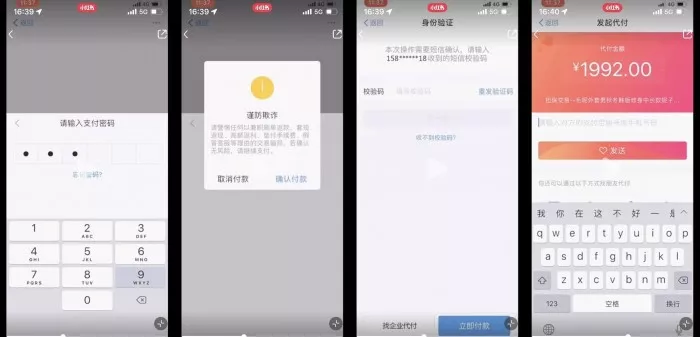
"Enterprise payment" in the "guidance operation video" received by Yang Wen. Picture provided by the interviewee
The reporter of the Beijing News saw the video that after scanning the above QR code, the payment method displayed on the page is Huabai. Click "pay now". After entering the payment password, a purchase prompt will appear. Then click OK and jump to the SMS verification page. There are two buttons "pay on behalf of the enterprise" and "pay now" below.
Special tips in the video, do not enter the mobile phone verification code, as long as you enter the merchant account, you can let the merchant pay.
In the actual operation, Yang Wen did not see the option of "enterprise payment".
She hesitated and thought that the other party said that the QR code was valid within two minutes, so she clicked the payment button on the screen and entered the payment password.
At the moment of losing, Yang Wen realized that he actually paid with the balance of Huabai. The price of clothes sent and photographed was just lower than but close to the amount of Huabai.
She turned to the so-called introducer and told the other party that she didn't see the so-called "enterprise payment". The other party said it was impossible. It was Yang Wen's operation error. Then she sent another customer service account and asked her to contact to apply for a refund.
"Customer service" repeatedly promised that it would return, and asked Yang Wen to provide a screenshot of the total assets in Alipay and pay a deposit of 500 yuan. After Yang Wen made a voice call, the phone was hung up and never connected again.
The customer service of Alipay said that there was no "enterprise payment" function in Alipay payment, and the other party reminded Yang Wen to be cautious about any password input or code scanning payment.
At this time, Yang Wen fully realized that he had been cheated. At this time, she found that she was removed from the group by the introducer and deleted her QQ friend.
Liu Zhenzhen was not so lucky. After paying 409 yuan for the video operation, he was cheated out of 800 yuan again in the form of "deposit" under the return guarantee of "customer service".
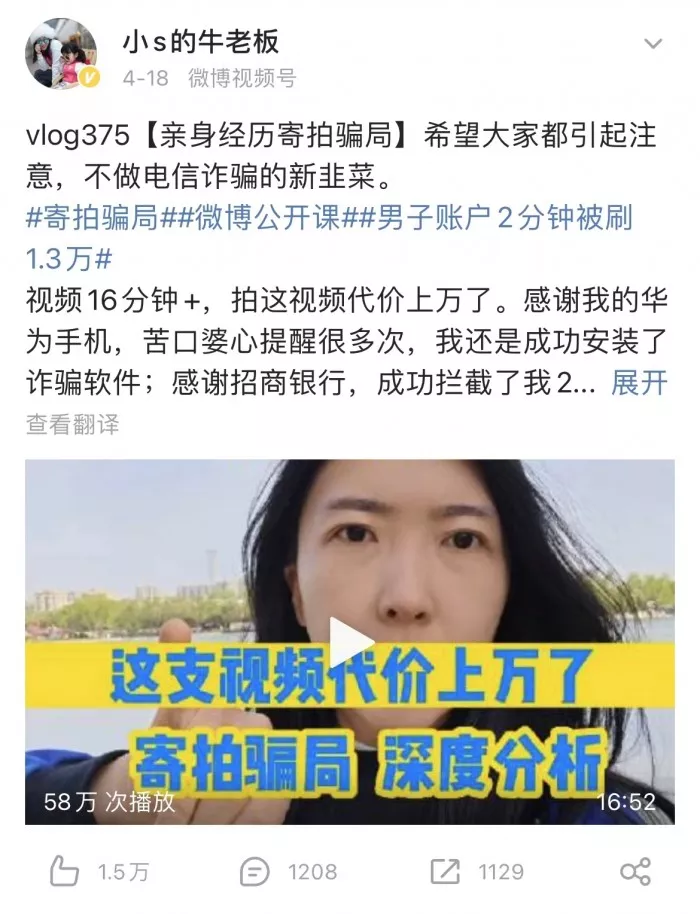
Niuniu released a video to remind netizens after being cheated. Picture provided by the interviewee
Behind the chaos of "sending photos"
The emergence of "sending and shooting models" corresponds to the need for e-commerce businesses to "brush orders" to increase the transaction volume.
As early as 2015, Taobao began to strictly investigate and brush orders. Since then, many e-commerce platforms have also begun to increase the review of merchants' bill swiping year by year.
With regard to bill swiping, the public security department has also repeatedly reminded that the bill swiping behavior is suspected of being illegal. Any bank swiping that needs to recharge or advance funds in advance is fraud.
Lawyer LAN Tianbin, partner of Jiangsu fade Dongheng law firm, said based on many years of work experience that the bill swiping scam has existed for many years. It captures people's psychology of making money in their spare time and makes people have the illusion of making extra money. During the epidemic, more people brush their mobile phones at home and in a closed space, or even do nothing, and criminals take advantage of it.
In January this year, the Shanghai municipal procuratorate released the white paper on the prosecution of cybercrime in Shanghai (2021), which mentioned that the goal of cybercrime has also been gradually refined. The online part-time job in the name of "sending models" makes full use of the psychology of young people who love taking photos and want to make money.
Lawyer LAN Tianbin reminded that after the fraud, you can timely fix and collect relevant evidence materials, such as bank flow records and wechat chat records, report the case to the local public security organ, state in detail the process of being cheated, and request the public security organ to file a criminal case, arrest the fraudsters and recover the losses as soon as possible. If there are bank accounts of fraudsters, you can request the public security organ to freeze them as soon as possible. In addition, victims can also unite to report the case together.
However, we should also admit that the difficulty of cyber crime cases is that fraudsters may be abroad and it is difficult to catch them; Secondly, the server may be overseas, so it is difficult to obtain evidence; Third, the funds obtained from fraud are divided into parts and flow to many bank card numbers, which is difficult to investigate; Fourth, there are many victims, even all over the country, so it is difficult to verify.
After being cheated, Yang Wen searched the keyword "send photos" on the social platform, and she found that a large number of victims on the Internet bitterly advised people who wanted to be "send photos". She was very confused. She didn't brush these cases of being cheated before she was cheated?
Niuniu is glad that she didn't take any photos. Her lawyer friend told her, "the peach trap is more terrible than cheating money."
Li Jing took the initiative to post a post on the social platform to be alert to the sending and shooting platform, hoping that everyone would stop making "cut leeks". She also searched the post of "can I do sending photos", shared her experience below and told "run!"
A few days ago, another girl sent a private letter to thank her. She smiled and said, "save another one".
(except LAN Tianbin, other names in the text are pseudonyms)
Beijing News reporter Li Cong intern Lei Xinyu